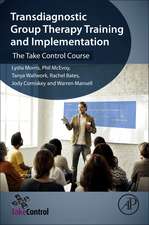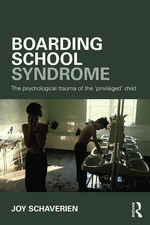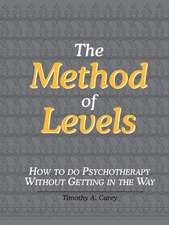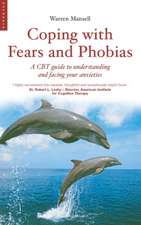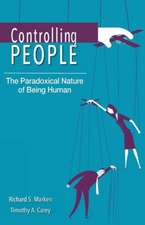Principles-Based Counselling and Psychotherapy: A Method of Levels approach
Autor Timothy A. Carey, Warren Mansell, Sara Taien Limba Engleză Hardback – 8 iun 2015
Principles-Based Counselling and Psychotherapy promotes a Method of Levels (MOL) approach to counselling and psychotherapy. Using clinical examples and vignettes to help practitioners implement a principles-based approach, this book describes three fundamental principles for effective therapeutic practice and their clinical implications. The first chapter of the book provides a rationale for the principles-based approach. The second chapter describes the three principles of control, conflict, and reorganisation and how they relate to each other from within a robust theory of physical and psychological functioning. The remainder of the book covers important aspects of psychological treatment such as the therapeutic relationship, appointment scheduling, and the change process from the application of these three principles.
With important implications for all therapeutic approaches, Principles-Based Counselling and Psychotherapy will be an invaluable resource for psychotherapists, counsellors and clinical psychologists in practice and training. It provides clarity about their role, and a means for providing a resolution to psychological distress and improving the effectiveness of their practice.
| Toate formatele și edițiile | Preț | Express |
|---|---|---|
| Paperback (1) | 395.93 lei 6-8 săpt. | |
| Taylor & Francis – 5 iun 2015 | 395.93 lei 6-8 săpt. | |
| Hardback (1) | 1163.19 lei 6-8 săpt. | |
| Taylor & Francis – 8 iun 2015 | 1163.19 lei 6-8 săpt. |
Preț: 1163.19 lei
Preț vechi: 1418.52 lei
-18% Nou
Puncte Express: 1745
Preț estimativ în valută:
222.60€ • 231.08$ • 185.61£
222.60€ • 231.08$ • 185.61£
Carte tipărită la comandă
Livrare economică 22 martie-05 aprilie
Preluare comenzi: 021 569.72.76
Specificații
ISBN-13: 9780415738774
ISBN-10: 0415738776
Pagini: 184
Ilustrații: 5 black & white illustrations, 1 black & white tables
Dimensiuni: 156 x 234 x 13 mm
Greutate: 0.44 kg
Ediția:1
Editura: Taylor & Francis
Colecția Routledge
Locul publicării:Oxford, United Kingdom
ISBN-10: 0415738776
Pagini: 184
Ilustrații: 5 black & white illustrations, 1 black & white tables
Dimensiuni: 156 x 234 x 13 mm
Greutate: 0.44 kg
Ediția:1
Editura: Taylor & Francis
Colecția Routledge
Locul publicării:Oxford, United Kingdom
Public țintă
Postgraduate, Professional, and Professional Practice & DevelopmentCuprins
A Principles-Based Approach to Therapy: The What and the Why. The Principles: Control, Conflict, and Reorganisation. The Clinical Implications: A Summary. Clarifying Roles: Both the Therapist and the Client. The Therapeutic Relationship. Putting Clients in Charge: Client-Led Appointment Scheduling. Making Therapy Sessions More Therapeutic. Treat the Distress Not the Symptoms. Therapeutic Change: Expect it at Any Time. How it All Works in Practice.
Recenzii
"This new book from Carey, Mansell and Tai is a refreshing reading. My enthusiasm with this new perspective is that central features of MOL approach are important bridges between several methods of therapy, from cognitive-behavior, to constructivist and process-oriented, to experiential therapies. Therapists focus in understanding clients’ meaning-making processes, center in clients’ distress (not in their symptoms), emphasize the therapeutic relationship, conceive clients as experts into their own lives, and highlight the therapeutic power of each individual session. A must read for all psychotherapists, both experienced and trainees." – Miguel M. Gonçalves, PhD, Professor, Director - Psychology Research Center (CIPsi), Vice-President - School of Psychology, University of Minho, Braga, Portugal
"This book notes in its introduction that it hopes to intrigue, challenge and excite the reader. In a refreshing text, which slices therapeutic work in a novel direction by advocating a principles-based approach, it certainly achieved these goals for me." – Terry Hanley, Director of the Doctorate in Counselling Psychology at the University of Manchester, UK
"Carey, Mansell, and Tai lay out a set of principles that will help you cut through the morass of conflicting therapeutic techniques and approaches and deliver more effective and consumer-friendly treatment." - Scott D. Miller, Ph.D., www.centerforclinicalexcellence.com
"This book offers a reader-friendly, example-packed account of the Method of Levels (MOL), an innovative therapy grounded in the principles of Perceptual Control Theory (PCT). PCT holds that people control their lives by acting to match their perceptions with their goals. MOL suggests that when clients' goals conflict with each other, a path out of conflict is stepping up a level to view the conflicting goals from a broader perspective. The therapy is radically person-centered without being nondirective. It focuses on articulating clients' goals and perceptions, facilitating--but not imposing--a productive reorganization. A valuable book for clinicians seeking a fresh perspective."- William B. Stiles, Professor Emeritus, Miami University, Oxford, Ohio, USA
"Carey, Mansell, and Tai provide a compelling description and argument for principle-based counselling. They demonstrate the wisdom of focusing on principles over techniques. They explain the dynamics of change and why profound changes can occur in a just a few or even a single session. A very provocative and wise book." - Michael J. Lambert, Ph.D., Professor of Psychology, Susa Young Gates University Professor, Brigham Young University, USA
"This book notes in its introduction that it hopes to intrigue, challenge and excite the reader. In a refreshing text, which slices therapeutic work in a novel direction by advocating a principles-based approach, it certainly achieved these goals for me." – Terry Hanley, Director of the Doctorate in Counselling Psychology at the University of Manchester, UK
"Carey, Mansell, and Tai lay out a set of principles that will help you cut through the morass of conflicting therapeutic techniques and approaches and deliver more effective and consumer-friendly treatment." - Scott D. Miller, Ph.D., www.centerforclinicalexcellence.com
"This book offers a reader-friendly, example-packed account of the Method of Levels (MOL), an innovative therapy grounded in the principles of Perceptual Control Theory (PCT). PCT holds that people control their lives by acting to match their perceptions with their goals. MOL suggests that when clients' goals conflict with each other, a path out of conflict is stepping up a level to view the conflicting goals from a broader perspective. The therapy is radically person-centered without being nondirective. It focuses on articulating clients' goals and perceptions, facilitating--but not imposing--a productive reorganization. A valuable book for clinicians seeking a fresh perspective."- William B. Stiles, Professor Emeritus, Miami University, Oxford, Ohio, USA
"Carey, Mansell, and Tai provide a compelling description and argument for principle-based counselling. They demonstrate the wisdom of focusing on principles over techniques. They explain the dynamics of change and why profound changes can occur in a just a few or even a single session. A very provocative and wise book." - Michael J. Lambert, Ph.D., Professor of Psychology, Susa Young Gates University Professor, Brigham Young University, USA
Descriere
This book promotes a principles-based process called the Method of Levels approach for effective therapeutic practice and its clinical implication.

